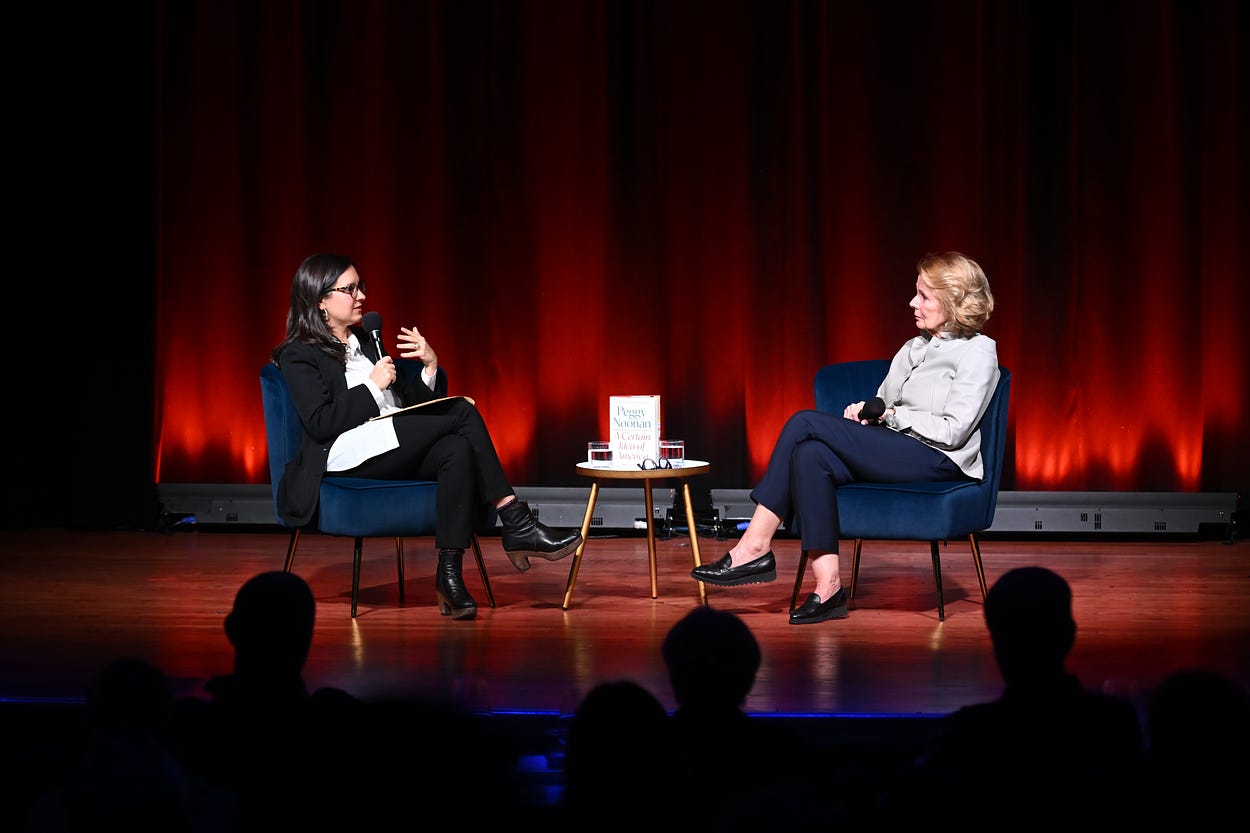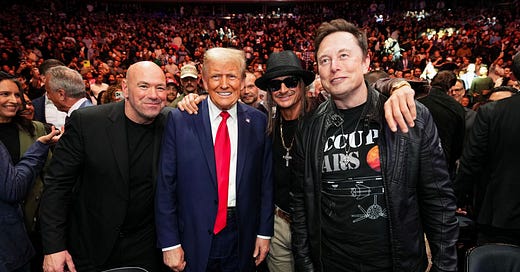
The Free Press

Three days after the election, Justine Bateman, the former Family Ties star, catapulted herself into the political muck with a tweetstorm to her 140,000 followers that began: “Decompressing from walking on eggshells for the past four years.”
She continued: “Common sense was discarded, intellectual discussion was demonized. . . Complete intolerance became almost a religion and one’s professional and social life was threatened almost constantly. Those that spoke otherwise were ruined as a warning to others. Their destruction was displayed in the ‘town square’ of social media for all to see.”
In other words, she said out loud the thing everyone has been thinking.
The tweetstorm went viral, and her followers more than doubled. People responded on X with tweets like: “A long war just ended and I’m finally home” and “It’s okay to be normal.”
“She’s definitely striking a strong nerve!” Bateman’s publicist, Elizabeth Much, emailed me.
At 58, Bateman is a member of Generation X, as am I, so I was hardly surprised to see a Gen Xer—those of us who mostly grew up in the 1970s and early 1980s—willing to say what so many Americans (of all ages) had been thinking: that they were done with being told how to think. That they would no longer put up with the travesties of the past four or eight or 10 years, or whenever you mark the beginning of the Great Awokening: the cancel culture, the pronoun fetish, the war on supposed “disinformation,” and all the rest of it.
One of the biggest headlines to come out of the recent election is that Gen X—hardly nationalist or populist—broke for Trump. Broke hard—backing him by 10 points. (Boomers, by contrast, split their vote between Trump and Kamala Harris.) Maybe part of it was that we had grown up in a distinctly unpolitical moment, when there were no wars to protest and no civil rights to champion. There was, about us, an all-pervasive don’t-give-a-shit quality, and it was reflected in our Ray-Bans, our irony, our apathy. Mostly, we wanted to be left alone—by our parents, by the sex ed counselors preaching abstinence, by Nancy Reagan telling us to “Just say no.” We were, for the most part, ideologically committed to nothing.
Growing up in the San Fernando Valley, Bateman told me when we spoke last week via Zoom, she never gave politics much thought. It was “like one tiny part of you, one grain of sand on a huge beach.”
She said she started to notice a change in the political climate around 2012. Although she initially felt that Black Lives Matter and #MeToo “were important movements,” she concluded that eventually, “there was an overgrowth of people wanting to be part of it, wanting to qualify, and the qualifications for these particular hashtags became wider and wider, and more diluted.”
In other words, it went too far, became too extreme—especially the #MeToo movement, “with people going, ‘Oh, I want to be part of that, but I don’t know that I qualify,’ and then other women talking you into it, saying, ‘No, you have been sexually assaulted, you just repressed it.’ ”
Then came 2020: the pandemic, George Floyd, the riots, the groupthink—“these people necessitating that I think like them, and policing what people say, and what they tweet, and what they like on a social media post.”
She hated the rise of the progressive mob. It was antithetical to everything she believed in. “The only way you get that kind of momentum behind destroying peoples’ lives is when you have a mob mentality,” Bateman said. “I felt like the fact that Trump won cut the momentum of that mob mentality.”
When I asked Bateman why she had “come out,” as it were, on X, why she’d decided to make herself something of a pariah in uber-progressive Hollywood, she said: “Everyone should be able to live their life the way they want to, without infringing on somebody else’s ability to freely live their life the way they want, and that’s the whole thing. You follow that within a society, and you’re golden—you know what I mean? You can’t fail.”
She didn’t want to say whether she’d voted for Trump. “I’m just not playing that game. I don’t want to participate in that, like, ‘Okay, here we go, we can put you in this box.’ ” Nor did she want to say what her brother, the star of the Emmy-winning series Ozark, thought of his sister coming out of the “political closet.”
“You’d have to ask him,” she said. “I mean, I love my brother. I couldn’t care less how he votes or how he voted in the past, or how he votes in the future. It’s just not on the list of things that’s important to me about who a person is.”
But it was hard to miss the anti-Democrat vibe. Anti-scold, anti-pronouns, anti–“woke army.” Her most fervent hope is that people might be roused from their stupor. From the self-censorship. She cited, for example, gender-affirming care for minors. “If somebody disagrees about, you know, chopping off healthy body parts before someone is eighteen, then let’s be open to hearing a counterargument,” Bateman said.
What she will do with this political moment, and her new momentum, is yet to be seen. One idea: She thinks it’s time for someone to create a new show like Family Ties.
The show ran from 1982 until 1989, and it starred Michael J. Fox. He played Alex P. Keaton, a young Republican who sleeps next to a photograph of Richard Nixon, and whose parents are ex-hippies. (Bateman played Mallory Keaton, Alex’s sister, who’s more into boys and clothes than changing the world.)
The gimmick is the generational clash of values and politics—which was meant to make you laugh. It was funny. The show was a ratings blockbuster—and Ronald Reagan’s favorite show.
But as recently as a few weeks ago and definitely a year or two ago, it would have been difficult, if not impossible, to produce a show like Family Ties, Bateman told me. The progressive scolds would have called Alex a white supremacist, and they would have loathed the ex-hippie parents for accommodating their kids’ shallow, capitalist, racist, sexist, xenophobic values rather than banishing them from their home.
But now?
Now, Bateman said, we’re in a new era. “Now that there’s been this shift—I’m not just talking politically, but spiritually—it might be exactly the kind of show that they should do,” she said. She told me she’d recently written an “anti-woke script.” “It’s called Panda Man, and it’s a satire on 2020,” Bateman said. “I have to get funding. People like it, and then they go, ‘But I can’t, we can’t—you know.’ ”
But she was confident, now, that it would get made.
“I feel like comedy and satire are one of those things in society that kind of keep things in check, and that needs to come back,” she said. “My script can be part of that.”
Two days after our meeting, Bateman tweeted a response to the kerfuffle around her original thread.
“There is nothing at all controversial with what I’m saying,” she wrote. “I am expressing relief at a lifting of a spiritual heaviness that has been on our society for the past 4 years or more.”
She added, “For those of you who have reached out to tell me to ‘beware of the group with whom you are associating,’ I say, ‘Fuck off.’ If you don’t like it,” she concluded, “move the fuck on.’ ”
Peter Savodnik is a writer and editor for The Free Press. Read his piece “Bret Easton Ellis’s Great Defense of Gen X,” and follow him on X (formerly Twitter) @PeterSavodnik.
For more coverage of the 2024 election, click here.
And to support more of our independent journalism mission, become a Free Press subscriber today:
















